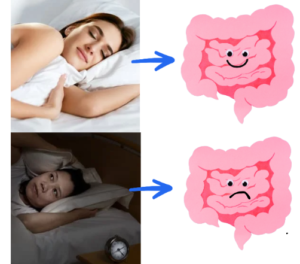Understanding the Critical Relationship Between Quality Sleep and Digestive Health
Sleep serves as more than just a period of rest; it is an essential mechanism that profoundly impacts our digestion. Although the connection may not be instantly obvious, the intricate interplay between sleep and digestive wellness encompasses various physiological processes that function in unison. The body's circadian rhythm, often referred to as the internal clock, synchronises both sleep cycles and digestive processes. This harmonious relationship helps to explain why individuals tend to experience hunger at similar times every day, showcasing how our bodies are finely tuned to align with natural biological cycles.
Understanding the Importance of Restorative Sleep for Digestive System Functionality 
Sleep is essential for the body’s ability to heal, rejuvenate, and restore itself after a long day. The deeper stages of sleep are particularly crucial for these restorative functions. During these profound phases, the organs, tissues, and cells comprising the digestive system not only enter a state of relaxation but also actively engage in vital repair processes. The body prioritises cellular repair and growth during deep sleep, especially regarding the renewal of cells that line the digestive tract. These cells endure constant wear and tear due to exposure to food particles and digestive enzymes, making their regeneration essential for maintaining the integrity of the gastrointestinal lining, which in turn enhances the efficiency of digestion.
Deep sleep also plays a critical role in strengthening the immune system, which is particularly important for the digestive system as it contains its own unique immune cells, activated by the beneficial bacteria residing in the gut. These immune cells are vital for defending the gut and entire digestive system against harmful microorganisms, ensuring a balanced ecosystem of bacteria within the gut environment. This immune response underlines the importance of quality sleep for maintaining a healthy digestive microbiome.
Moreover, the organs that constitute the digestive system play a vital role in detoxification, assisting in the removal of waste and harmful substances from the body. Deep sleep significantly enhances this detoxification process by boosting the functionality of the liver and kidneys, allowing these organs to operate at their peak efficiency. This synergistic relationship between sleep and detoxification is essential for overall digestive health and well-being.
Understanding How Gut Motility is Influenced by Sleep Patterns
A fundamental aspect of digestion is the efficient movement of food and waste through the digestive tract, a process known as gut motility. This critical process experiences significant changes during sleep. During both deep and light sleep, the rate of gut motility decreases notably. This reduction is a necessary adaptation that allows the digestive system to conserve energy, which is then redirected towards repairing digestive tissues. This energy-saving approach enhances the digestive process's efficiency when awake, optimising both nutrient absorption and waste elimination.
The migrating motor complex is a series of contractions that occur during fasting periods, including during sleep. This cycle is vital for gut motility, effectively clearing away food particles and residues that may linger within the digestive system. This natural cleansing mechanism of the digestive tract helps to minimise the risks of bacterial overgrowth, fostering a healthy gut environment. Notably, the migrating motor complex is most actively engaged during the night when individuals are fasting and asleep, highlighting the crucial role of sleep in safeguarding the health of the digestive system.
As dawn approaches, gut motility gradually increases, preparing the digestive system to effectively process and digest food. This rise in motility can also trigger the first bowel movement of the day, showcasing the finely tuned relationship between sleep and gut motility. Gaining a deeper understanding of this connection is essential for optimising digestive health and enhancing overall well-being.
Investigating Hormonal Interactions Between Sleep Patterns and Digestive Health
Ghrelin, often referred to as the hunger hormone, plays a significant role in stimulating appetite. In contrast, leptin sends signals to the brain indicating that the stomach is full, assisting in the prevention of overeating. Together, these hormones are pivotal in regulating appetite, yet their functions can be negatively impacted by inadequate sleep.
Even just one night of poor sleep can result in elevated levels of ghrelin, which can lead to increased appetite and cravings for carbohydrates. This phenomenon is often described as feeling ‘hangry’. To complicate matters, levels of leptin can decline following insufficient sleep, disrupting the signals that indicate satiety. This creates a challenging scenario where individuals may overeat and make unhealthy food choices while struggling to heed their body's signals to stop eating. While occasional poor sleep may not lead to severe consequences, chronic insomnia can result in significant digestive issues, including inflammation in the gut, liver disorders, gastroesophageal reflux disease, inflammatory bowel disease, and even colorectal cancer, alongside contributing to weight gain.
Identifying the Consequences of Sleep Disruption on Digestive Health
Disruptions to sleep can lead to a range of digestive issues. Factors such as shift work, particularly night shifts, and experiencing jet lag can considerably interfere with sleep patterns and disrupt the body’s internal clock. Additionally, late-night eating or irregular meal timings can adversely affect the quality of sleep. The circadian rhythm that governs sleep is closely tied to natural sunlight, which is crucial for maintaining a healthy sleep-wake cycle.
Regrettably, in our modern, technology-driven culture, many individuals spend a significant portion of their daytime indoors, resulting in reduced exposure to natural light. This shift has led to increased exposure to blue light emitted by devices such as laptops, televisions, and smartphones, further disrupting the sleep cycle and sleep patterns, particularly when this exposure occurs shortly before bedtime.
The cumulative effects of these various factors can lead to severe digestive issues, including diarrhea, ulcers, inflammatory bowel disease, or disruption of the delicate balance between beneficial and pathogenic bacteria in the gut. This imbalance can also damage the gut lining, exacerbating issues related to digestive health.
Enhancing Microbiome Health Through Quality Sleep Practices
The microbiome refers to the trillions of microorganisms inhabiting the gut, predominantly consisting of beneficial bacteria known as probiotics, alongside viruses, fungi, and potentially harmful bacteria. These microbes are vital not only for overall health but also for digestive health. They enhance immune responses and assist in digestion, facilitating the production of essential vitamins, enzymes, hormones, and amino acids. Recent studies have underscored a significant connection between the microbiome and sleep, indicating that disrupted sleep or chronic insomnia can negatively affect the balance of these microbes, ultimately impacting digestive health and overall well-being.
Exploring the Complex Interactions Between Microbiome Health and Sleep Quality
The interplay between sleep and microbiome health is both intricate and multifaceted. Poor sleep can negatively impact microbiome balance, while an imbalanced microbiome can also detrimentally affect sleep quality. To appreciate this complex interaction, one study discovered a correlation between a higher abundance of specific bacterial types in the gut and quicker sleep onset, alongside fewer awakenings during the night. Although this article cannot encompass all findings, the essential takeaway is that nurturing a diverse and abundant population of beneficial bacteria in the gut is crucial for achieving optimal sleep, effective digestion, and maintaining overall health and wellness.
Investigating the Relationship Between Stress, Sleep, and Digestive Health
A common consequence of stress and anxiety is disrupted sleep. Conversely, these mental health challenges can also adversely affect the physical health and functionality of the digestive system. Such disruptions can lead to altered gut motility and contribute to various issues, including indigestion, ulcers, and irritable bowel syndrome. A critical factor in this dynamic is the effect of the so-called stress hormone, cortisol.
Understanding How Cortisol Affects Digestive Processes
When cortisol levels rise, the body's response is to enter a fight-or-flight state. This physiological reaction leads to blood flow being redirected to critical areas such as the heart, brain, lungs, and muscles, while diverting it away from the digestive system. This response prepares the individual to either confront danger or escape, a reaction that was crucial for survival in prehistoric times.
In modern society, however, stressors are often less life-threatening, encompassing financial concerns, work pressures, or insufficient sleep. While the short-term redirection of blood flow may be beneficial in acute situations, chronic stress can have detrimental effects on the digestive system, particularly concerning gut motility. Symptoms of this chronic stress can manifest as constipation, diarrhea, indigestion, gas, and bloating. Therefore, implementing effective stress management strategies is imperative for nurturing both gut health and achieving quality sleep.
Ensuring adequate sleep is paramount for maintaining a healthy digestive system, as the relationship between sleep and digestion is inherently linked. Prioritising effective sleep hygiene practices is essential for achieving restorative sleep. This includes minimising exposure to blue light from electronic devices, adhering to a consistent sleep schedule, creating a cool and dark sleeping environment, avoiding food intake within two hours before bedtime, and ensuring exposure to natural light throughout the day, particularly in the morning.
References
Understanding Digestive Health and Circadian Rhythms
Exploring Sleep Dysfunction and Digestive Conditions
Examining the Link Between the Gut Microbiome and Sleep
Investigating Stress and Its Effects on the Digestive System
The Article: How Sleep Affects Your Digestive System appeared first on https://janestevensnutrition.com
The Article: Sleep’s Impact on Your Digestive System Explained appeared first on https://janestevens.net
The Article Sleep’s Impact on Digestive Health Explained Was Found On https://limitsofstrategy.com

